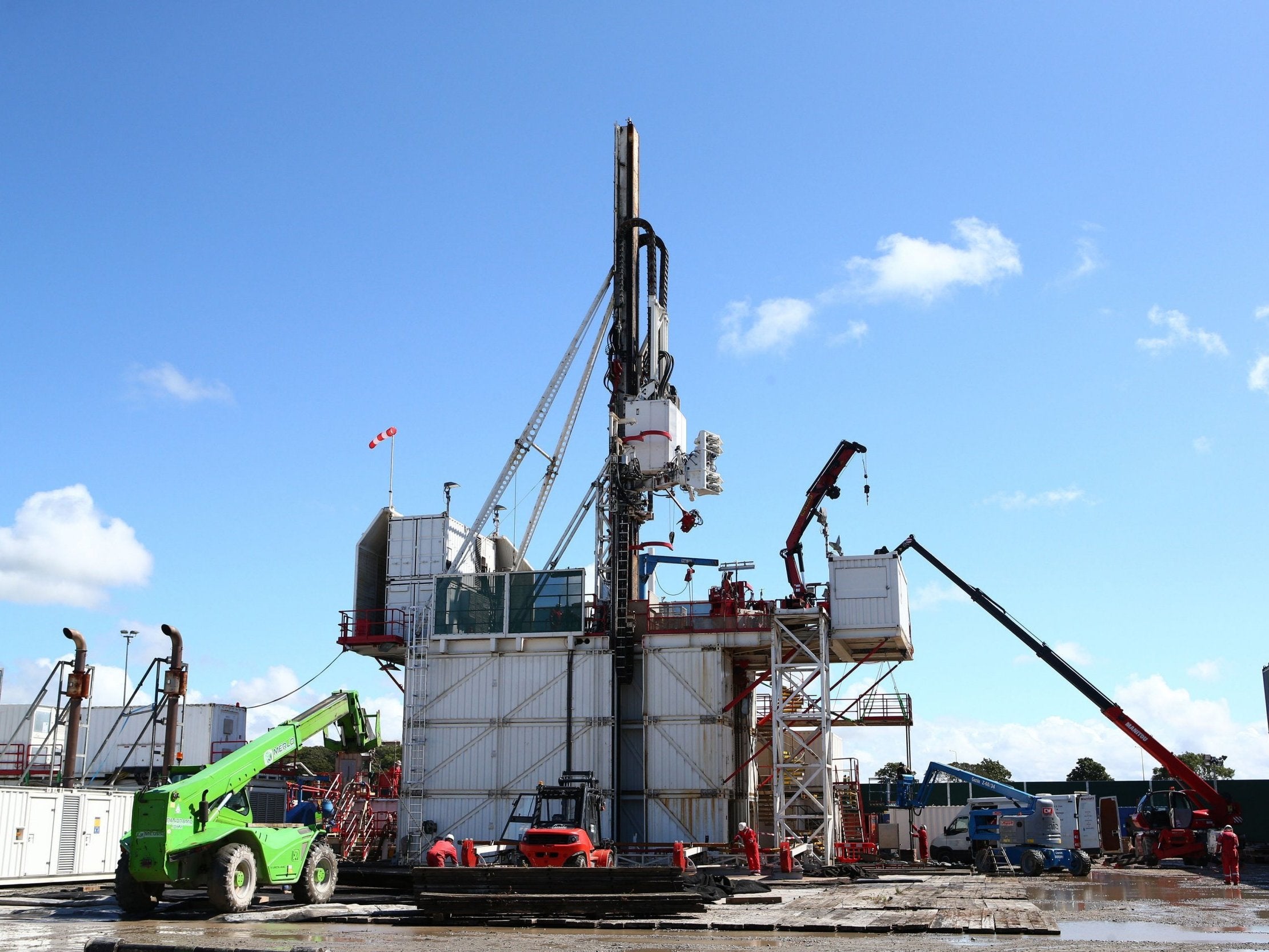Fracking in Lancashire halted at last minute by legal challenge
Injunction means drilling firm Cuadrilla must await findings of judicial review it describes as 'hopelessly weak'
Your support helps us to tell the story
From reproductive rights to climate change to Big Tech, The Independent is on the ground when the story is developing. Whether it's investigating the financials of Elon Musk's pro-Trump PAC or producing our latest documentary, 'The A Word', which shines a light on the American women fighting for reproductive rights, we know how important it is to parse out the facts from the messaging.
At such a critical moment in US history, we need reporters on the ground. Your donation allows us to keep sending journalists to speak to both sides of the story.
The Independent is trusted by Americans across the entire political spectrum. And unlike many other quality news outlets, we choose not to lock Americans out of our reporting and analysis with paywalls. We believe quality journalism should be available to everyone, paid for by those who can afford it.
Your support makes all the difference.Hours after announcing fracking operations were to begin in Lancashire next week, drilling company Cuadrilla now faces further delays after a successful injunction was brought against the firm.
The injunction request was made to the courts by Lancashire resident Bob Dennett, and is the latest victory for campaigners who have repeatedly thwarted efforts to extract shale gas in England.
It means Cuadrilla must await the findings of a judicial review, also by Mr Dennett, which asserts Lancashire County Council’s emergency response planning is inadequate.
But the company has described the judicial review claim, which focuses on the Preston New Road site, as “hopelessly weak”.
A full injunction hearing, expected to take place on Wednesday 10 October, will decide whether the injunction is upheld or whether fracking can commence while the judicial review over emergency procedures is outstanding.
Liz Hutchins, Friends of the Earth director of campaigns, said: “The environmental risks of fracking are well documented and issues regarding safety at the Preston New Road site have been raised before.
“It’s right that local people continue to highlight these concerns, through the courts if necessary.”
Cuadrilla is planning to begin an explorative hydraulic fracturing programme lasting three months, releasing natural gas more than 2km below the surface.
If it eventually goes ahead, it will be the first time any fracking has been undertaken in the UK since the company caused two minor earthquakes nearby.

The controversial extraction of the fossil fuel comes on the eve of a damning report by the Intergovernmental Panel on Climate Change (IPCC), described as “life changing”, and detailing the extent to which greenhouse gas emissions are impacting the planet.
Fracking has already been banned across Wales, Scotland and Northern Ireland due to concern over the risks and environmental effects of the practice, leaving England as the only option.
At the last general election the Conservative party called for a US style fracking “revolution” in the UK, to reduce imports of foreign natural gas. It is the only large political party supporting the practice, with the Labour Party, Liberal Democrats and the Greens all opposed.
The planned start to drilling saw fierce backlash from campaigners.
Kate Blagojevic, head of energy at Greenpeace UK, said: “Seven years after the last UK well was fracked, the industry has produced no energy and no money.
“But to try to keep it going, the government has changed property law to give frackers access to the land under your home and overruled local councils and people to force fracking on communities.
“Millions have been spent on policing to shield the frackers from resistance in those communities, and protesters have been sent to prison for trying to protect those communities and the planet.
“The government should take heed, stop forcing fracking on a reluctant nation and start backing renewables now.”
Before the injunction was granted, Francis Egan, chief executive of Cuadrilla, said: “The start of hydraulic fracturing is the final milestone in the journey to assessing the flow rates of natural gas from our Lancashire shale exploration wells.
“On completion of hydraulic fracturing and commencement of gas flow, we expect to have, in the first quarter of next year, an initial assessment of how much natural gas is likely to be recoverable from these first Lancashire shale wells.”
He added: “We are confident the flow rates will demonstrate Lancashire can play a major and leading role in safely providing a new source of natural gas for the UK.
“This cannot come a moment too soon as we currently rely on imports for over 50 per cent of the gas that we all need to heat our homes and offices and generate electricity.”
But academics have suggested a colossal industrial operation would be necessary even to halve imports.
England would have to build 6,100 wells to replace just 50 per cent of gas imports between 2021 and 2035, a study by Cardiff Business School found earlier this year.
It found that drilling this many wells would require more than 1,000 separate well pads for drilling equipment each covering 3.5 hectares and requiring access to roads and other facilities.
Laurie Underwood, an activist from anti-fracking group Reclaim the Power, said: “To get this far, the government and shale gas industry have had to imprison protesters, seek court injunctions to silence the public and change planning laws to push through fracking in the face of widespread opposition.
“The protests and blockades that have occurred outside drilling sites are not exceptional scenes; fracking companies and their investors should expect this at every place they attempt to frack. This industry is not scaleable and not viable.”

Join our commenting forum
Join thought-provoking conversations, follow other Independent readers and see their replies
Comments